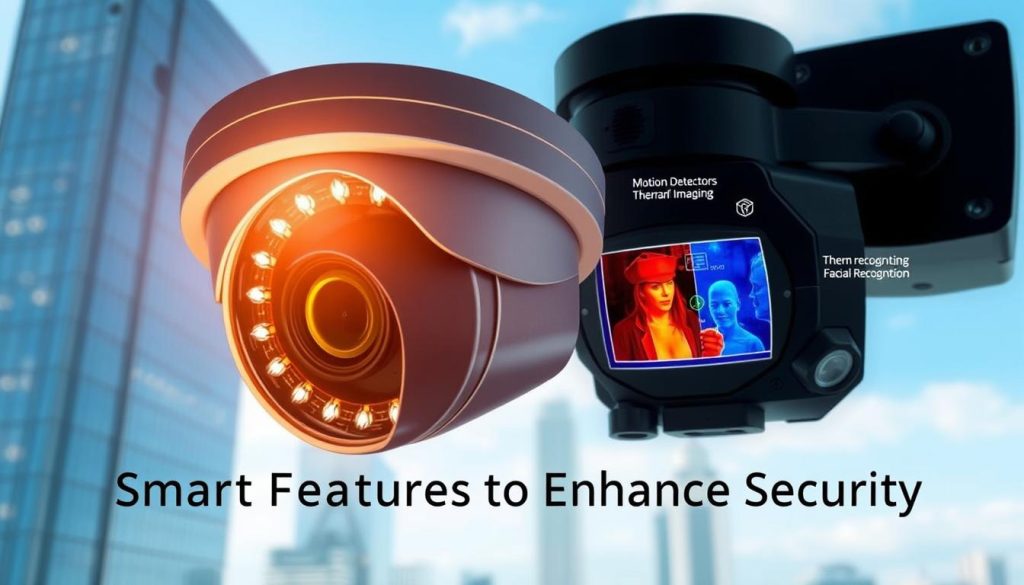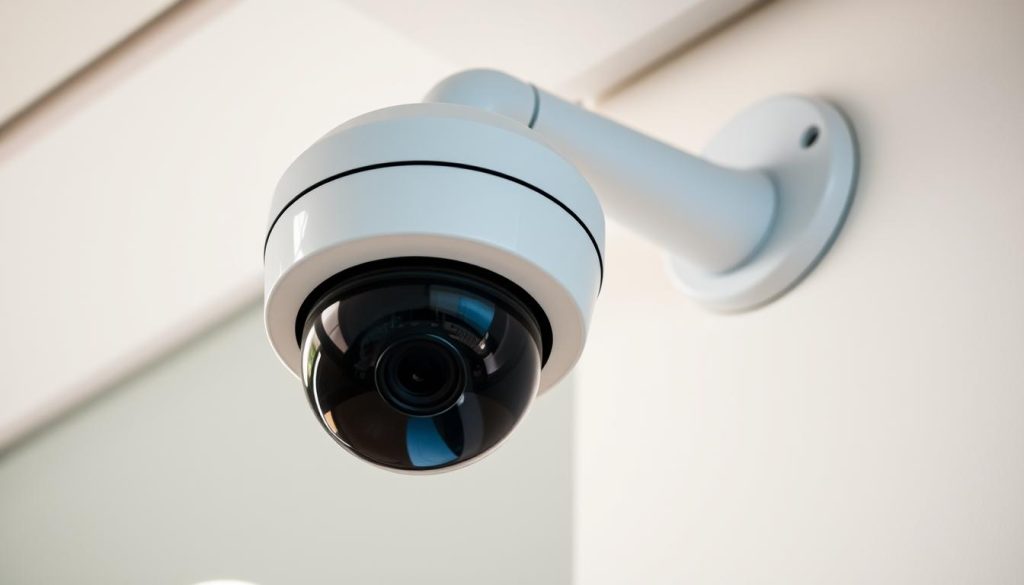Knowing if your CCTV camera is good quality is key for effective surveillance. You need to check several things like resolution, features, durability, and the maker’s reputation. High-resolution cameras (1080p or higher) help see things clearly. Features like night vision and field of view also matter a lot.
By knowing these things, you can protect your place better. You also make your security system work better.
Key Takeaways
- CCTV camera quality impacts overall security effectiveness.
- Look for high-resolution video (1080p or higher).
- Night vision capabilities are essential for low-light conditions.
- Evaluate the manufacturer’s reliability before purchase.
- Field of view is critical for full coverage.
Understanding Your Surveillance Needs
Before you buy CCTV, it’s key to assess your surveillance needs. Start by figuring out why you need CCTV. Do you want to stop theft, watch over your workplace, or keep an eye on your kids?
Defining the Purpose of CCTV Installation
Knowing your needs helps you pick the right gear. Think about what areas you need to watch and if you need cameras day or night. These answers help you make smart choices.
Assessing Location Requirements
It’s important to analyze where your cameras will go. Will they be inside, outside, or in high-risk spots? Knowing this helps choose the right camera type and features.
Determining Coverage Area
Also, think about how big the area is you want to cover. This will help you decide on camera resolution and lens. Picking the right cameras ensures you meet your surveillance goals.
Key Features of a Quality CCTV Camera
Choosing the right CCTV system means knowing what features are key. A good camera should have certain qualities. These ensure your space is well-protected.
High-Resolution Video
High-resolution video is a must for CCTV cameras. Cameras with 1080p or higher resolutions capture clear images. This is important for spotting faces and license plates.
Clear footage is not just better to watch. It’s also useful as evidence when needed.
Night Vision Capabilities
Surveillance doesn’t stop when it gets dark. Night vision technology is a must. Cameras with infrared can see in the dark, working all day and night.
This means you can keep an eye on things 24/7. Night vision is key for a reliable CCTV system.
Wide Angle Lens for Maximum Coverage
A wide angle lens is vital for covering more ground. Cameras with this feature can see more without needing many units. This makes installation easier and can save money.
It also means you can watch over more areas. This is important for keeping everything under surveillance.
How do I know if my CCTV camera is good quality?
Knowing if your CCTV camera is good quality is key for effective surveillance. By looking at certain features, you can make sure your system meets quality standards. Here are the main things to check when evaluating your camera.
Evaluating Video Quality Standards
First, check the camera’s resolution. A good CCTV system should show clear images that help identify people. Look for resolutions of 1080p or higher. This ensures you can see important details like license plates and faces.
Checking for Infrared Night Vision
Monitoring at night is important for any security system. Good infrared night vision is essential for seeing in the dark. A quality camera should let you see over 100 feet in the dark. This makes sure you can keep an eye on things even after the sun goes down.
Wireless vs. Wired CCTV Cameras
Choosing between wireless and wired CCTV cameras is key for a good surveillance system. Each type has its own benefits that can improve your security. It’s important to think about your needs and long-term goals when deciding.
Advantages of Wireless Cameras
Wireless CCTV cameras are great for many reasons. They’re easy to install without the need for cables. This makes them flexible and easy to move around. They also offer features like remote access and cloud storage, giving you more control.
Benefits of Wired Connections
Wired CCTV systems offer a strong and steady connection. They’re perfect for busy areas where cables might get in the way. They’re less likely to be affected by other devices, keeping your footage clear. Wired systems are also great for businesses needing reliable security.
Choosing between wireless and wired cameras depends on your specific needs. Think about what matters most to you, like ease of use, reliability, and performance. If you need help, expert security camera installers can offer valuable advice.
Durability and Weather Resistance
Choosing the right CCTV system means looking at its durability and weather resistance, more so for outdoor use. The quality of the cameras affects how long they last and how well they work in different weather. Knowing about IP ratings helps you pick cameras that can handle dust and water.
Understanding IP Ratings
IP ratings, or Ingress Protection ratings, show how well a camera can stand up to outside factors. For outdoor use, look for cameras with an IP rating of at least IP66. This means they’re strong against dust and can handle high-pressure water jets, keeping them working well in tough weather.
Vandal-Proof Housing Significance
Choosing vandal-proof cameras is key to protecting your surveillance system from damage. These cameras are made tough and can take impacts, perfect for areas where vandalism is common. By investing in vandal-proof solutions, you make your CCTV system last longer and feel more secure, knowing it’s safe.
Smart Features to Enhance Security
Modern surveillance systems now come with smart CCTV features to boost security. Features like motion detection and remote access make things easier and more effective. These advancements help security systems react and prevent issues before they happen.
Motion Detection Technology
Motion detection is key in today’s security systems. It lets cameras spot and act on unexpected movements. When it finds motion, it sends alerts right away, so users can keep an eye on their places without always watching.
This cuts down on false alarms and makes sure you’re always informed. It’s a smart way to stay safe during important times.
Remote Access and Alerts
Remote access lets users watch live camera feeds on their phones or tablets. This makes it easy to stay updated on what’s happening at home or work. Plus, getting alerts on your phone when there’s motion means you can act fast if something looks off.
These smart features together create a strong security system. It works well for homes and businesses alike.

Installation Considerations for CCTV Systems
Setting up a security system is a big decision. You must choose between doing it yourself or hiring a professional. Each option has its own benefits and drawbacks that affect how well your CCTV system works.
DIY Installation vs. Professional Help
Going the DIY route can save you money. It lets you learn about the system and how to install it. But, you need to know where to put cameras for the best coverage.
Hiring a pro, on the other hand, ensures your system is installed right. They know how to avoid mistakes and make the system work better for you.
- Cost considerations: DIY can save money, but consider time and effort.
- Expertise: Professionals bring specialized skills for optimal results.
- Long-term effectiveness: Proper installation enhances the longevity of your equipment.
Your choice between DIY and professional installation depends on your skills, resources, and security needs.
CCTV Camera Compatibility with Other Security Devices
Connecting CCTV cameras with alarm systems or other security devices boosts your security setup. It’s key to make sure all systems work well together. This way, you get a unified and quick-acting defense system.
Integration with Alarm Systems
Connecting CCTV cameras with alarm systems has many benefits. If a security issue is found, alarms can turn on nearby cameras to start recording. This makes it easier to see what’s happening and respond quickly.
Look for surveillance systems that support this integration for the best results.
Scalability for Future Needs
Choosing CCTV solutions that grow with you is smart. A system that can expand with your needs means you can add new cameras or devices easily. This saves time and money and keeps your security up to date.
Focus on systems that are easy to integrate and grow with you for long-term success.
Budgeting for a Quality CCTV System
When planning your CCTV budget, finding the right balance is key. Investing in top-notch security cameras might require a bigger budget. But, cheaper options often lack in important areas like resolution and durability.
Think about more than just the initial cost of your CCTV system. Consider ongoing expenses like maintenance, future upgrades, and warranty coverage. Choosing high-quality systems can save you money in the long run by providing reliable security.
The aim of smart budgeting for CCTV systems is to save money now and ensure safety later. By focusing on quality and affordability, you can find the perfect balance for your security needs.

